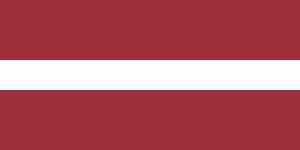Language/Standard-latvian/Culture/Latvian-language-and-literature
| ◀️ Accommodation and booking — Previous Lesson | Next Lesson — Latvian music and dance traditions ▶️ |
As a Standard Latvian language teacher with 20 years of experience, I am thrilled to welcome you to another lesson of our "Complete 0 to A1 Standard Latvian Course". In this lesson, we will explore the role of Latvian as an important symbol of Latvian identity and uncover some of the most notable works of Latvian literature, all while improving our language skills. Are you ready? Let's dive in!
Consider exploring these related pages after completing this lesson: Nature and outdoor recreation & Modern politics and society.
The importance of Latvian language to Latvian culture and identity
Language is one of the defining features of any culture, and Latvian is no exception. Spoken by approximately 1.3 million people worldwide, it is the official language of Latvia and a symbol of national identity. The Latvian language has a rich history, and its grammar is notoriously complex. However, learning Latvian allows you to connect with Latvian culture in a way that would otherwise be difficult.
Latvian is a Baltic language closely related to Lithuanian, and it has borrowed linguistic elements from neighboring languages such as German, Russian, and Swedish. Most Latvians are bilingual and speak both Latvian and Russian, which reflects the country's complex history and geopolitical context.
Latvian grammar and structure
Latvian grammar is complex, but it is also fascinating. Here are some of the key elements you need to know:
Nouns and their declensions
Latvian nouns come in three genders: masculine, feminine, and neuter. They are also declined according to seven different cases. The cases determine the function of the noun in the sentence, such as subject, object, possessive, and so on. Here is an example of the declension of the feminine noun 'māja' (house):
| Standard Latvian | Pronunciation | English |
|---|---|---|
| māja (nominative) | maa-ya | house |
| mājas (genitive) | maa-yas | of the house |
| mājai (dative) | maa-yai | to the house |
| māju (accusative) | maa-yu | the house |
| mājā (locative) | maa-yaah | in the house |
| mājās (instrumental) | maa-yaahs | with the house |
| mājas (vocative) | maa-yas | oh house |
Verbs and tenses
Latvian verbs have a complex system of conjugation based on person, number, and tense. There are four types of verbs, and each type has its distinct endings. The present tense is used to describe current actions, and the past tense is used for completed actions. Here is an example of the present tense conjugation of the verb 'runāt' (to speak):
| es | tu | viņš/viņa/viņi/viņas | mēs | jūs | tie/vieg/tās | |
|---|---|---|---|---|---|---|
| runāt | runāju | runā | runā | runājam | runājat | runā |
Adjectives and their agreement with nouns
Adjectives in Latvian agree with the gender, case, and number of the noun they modify. Here is an example of the adjective 'skaists' (beautiful) in different cases:
| Standard Latvian | Pronunciation | English |
|---|---|---|
| skaists (masculine nominative singular) | skaists | beautiful |
| skaista (feminine nominative singular) | skaista | beautiful |
| skaisti (masculine nominative plural) | skaisti | beautiful |
| skaistas (feminine nominative plural) | skaistas | beautiful |
Notable works of Latvian literature
Latvian literature has a long and rich history, dating back to the 16th century. Here are some of the most well-known authors and works:
Rainis
Rainis is one of the most celebrated Latvian writers and poets of all time. Born in 1865, he wrote prolifically in various genres, including poetry, drama, and fiction. His works are characterized by their philosophical depth, social consciousness, and lyrical beauty. Some of his most famous works include the plays "Uguns un nakts" (Fire and Night) and "Indulis un Ārija" (Indulis and Ārija) and the poem cycle "Tālas noskaņas zilā vakarā" (Distant moods on a blue evening).
Aspazija
Aspazija was a prominent Latvian female writer and translator who lived from 1865 to 1943. She was a champion of women's rights and an advocate of social justice, and her works tackled subjects such as love, gender inequality, and political oppression. Some of her most famous works include the poetry collections "Pēdējā atvaļinājumā" (On the Last Vacation) and "Lodzīšu dēli" (Sons of the Marshes).
Jānis Rainis
Jānis Rainis was a philosopher, writer, and politician who lived from 1865 to 1929. He was a key figure in the Latvian independence movement and served as Latvia's first Minister of Education. His writings range from poetry and plays to essays and political manifestos. Some of his most famous works include the play "Daugava" and the poem cycle "Lūgšana" (Prayer).
These are just a few examples of the many talented writers who have contributed to Latvian literature over the centuries. Reading Latvian literature in its original language is an excellent way to deepen your understanding of Latvian culture and language.
That's it for this lesson! I hope you learned something new and interesting about Latvian culture and language. Keep practicing, and I'll see you in the next lesson!
Other Lessons
- Latvian museums and exhibitions
- Latvian holidays and celebrations
- Latvia Timeline
- Latvian art and architecture
- Latvian music and dance traditions
- Modern politics and society
- Nature and outdoor recreation
- Latvian cities and regions
- Popular sports and events
| ◀️ Accommodation and booking — Previous Lesson | Next Lesson — Latvian music and dance traditions ▶️ |

